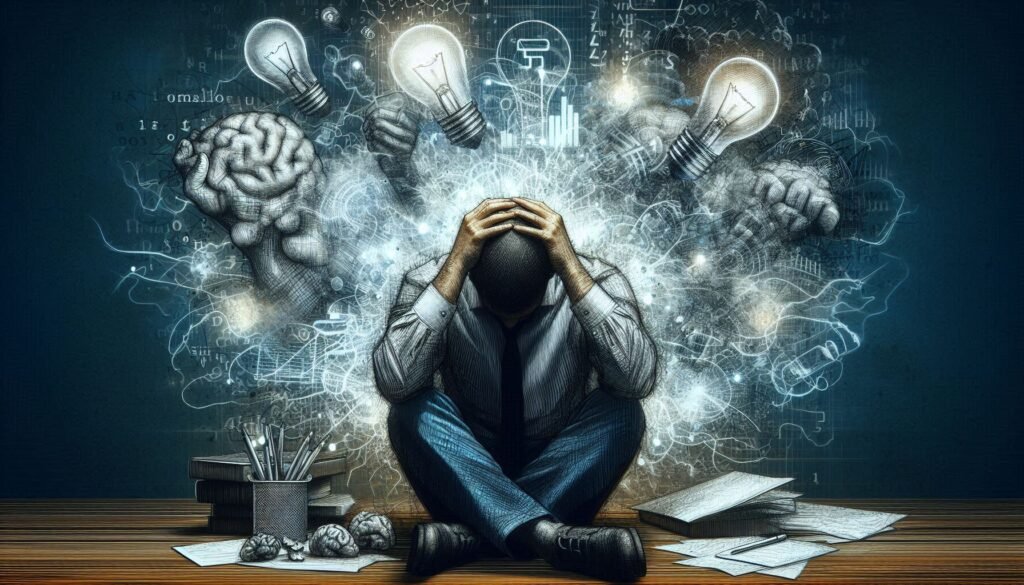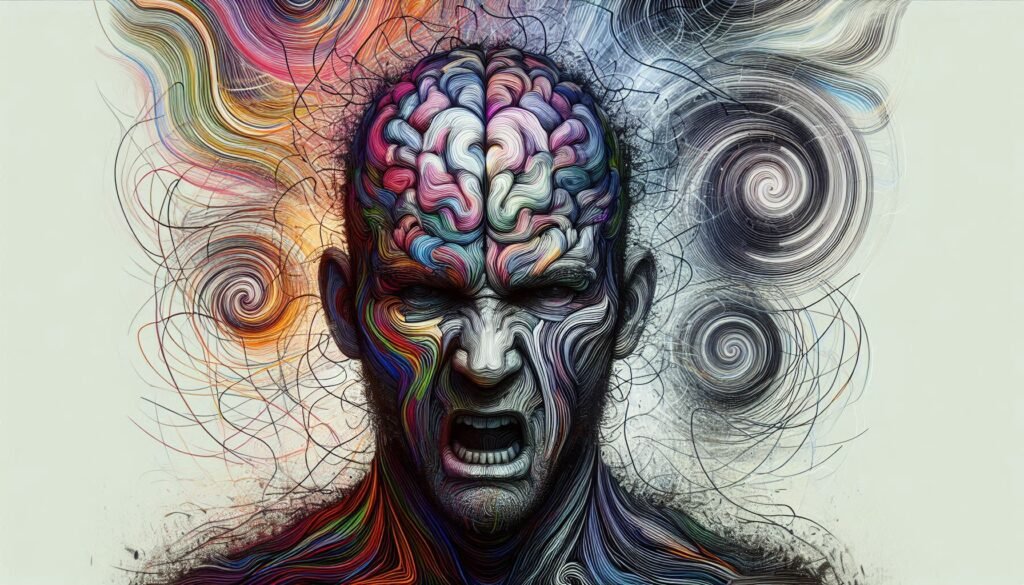Cognitive fatigue following traumatic brain injury (TBI) is a complex and often misunderstood phenomenon. Many individuals who experience a TBI report not just physical symptoms, but also an overwhelming sense of mental exhaustion that can linger long after the initial injury. This cognitive fatigue can significantly impact daily life, work performance, and overall quality of life.
As awareness around TBIs grows, it becomes essential to explore the intricacies of cognitive fatigue. Understanding its causes and manifestations can empower those affected to seek appropriate management strategies. Whether you’re navigating recovery yourself or supporting someone on this journey, recognizing how cognitive fatigue operates in the context of brain injuries will enhance your approach to treatment and coping mechanisms. Let’s delve into the nuances of this challenging condition together.

Understanding Cognitive Fatigue in the Context of Brain Injury
Cognitive fatigue following traumatic brain injury (TBI) refers to a state of mental exhaustion that can arise after the brain sustains trauma. Unlike general tiredness, cognitive fatigue is characterized by a profound sense of difficulty in thinking, concentrating, and processing information. This condition often persists long after physical symptoms have diminished.
Individuals may find simple tasks overwhelming. Everyday activities like reading, problem-solving, or even engaging in conversations can become exhausting challenges that drain their energy. Cognitive fatigue does not discriminate; it can affect anyone who has experienced a TBI regardless of severity.
The underlying mechanisms are still being studied but involve disruptions in neural pathways responsible for attention and executive function. These interruptions hinder optimal cognitive performance and lead to increased frustration among those affected.
Recognizing this unique aspect of recovery is crucial for both patients and caregivers. It paves the way for tailored approaches that address specific needs while fostering an environment conducive to healing.
Neurobiological Mechanisms Behind Post-Concussion Cognitive Fatigue
Cognitive fatigue following traumatic brain injury (TBI) is a complex phenomenon rooted in neurobiological changes. When the brain experiences trauma, it undergoes significant biochemical alterations that can affect energy metabolism and neural function. This disruption often leads to an imbalance between excitatory and inhibitory neurotransmitters, contributing to feelings of mental exhaustion.
Another key factor is inflammation. Following a concussion, the brain’s immune response kicks in, releasing cytokines that can impair cognitive processes. This inflammatory response not only affects neuronal communication but also hinders recovery by prolonging symptoms like fatigue.
Moreover, decreased cerebral blood flow has been observed post-TBI. Insufficient oxygen and nutrients reaching crucial areas of the brain can further exacerbate cognitive fatigue. The resulting deficits may manifest as difficulty concentrating or processing information efficiently.
Structural changes within the brain itself—such as damage to white matter pathways—can hinder effective communication among regions responsible for higher cognitive functions. These neurobiological mechanisms create a challenging landscape for those experiencing cognitive fatigue after TBI.
Recognizing the Signs and Symptoms of Cognitive Exhaustion
Cognitive exhaustion following a traumatic brain injury can manifest in various ways. Individuals may experience persistent mental fatigue, leading to difficulty concentrating and maintaining focus on tasks that were once manageable. This decline in cognitive performance can be frustrating and disheartening.
Memory problems are another common symptom of cognitive fatigue. Many people report forgetfulness or the inability to retain new information, making daily activities more challenging. Simple tasks might take longer than usual, further contributing to feelings of overwhelm.
Mood swings and irritability often accompany cognitive exhaustion as well. Frustration over cognitive limitations can lead to emotional distress, affecting relationships with friends and family. Recognizing these changes is essential for effective management.
Sleep disturbances frequently correlate with cognitive fatigue too. Insomnia or non-restorative sleep can exacerbate symptoms, creating a cycle that’s hard to break. Being aware of these signs helps individuals seek appropriate support and interventions sooner rather than later.
Impact of Cognitive Fatigue on Daily Life and Productivity
Cognitive fatigue following traumatic brain injury can significantly impact daily life. Individuals may find it challenging to concentrate on tasks that once seemed effortless. The inability to focus often leads to increased frustration and a sense of helplessness.
Productivity levels are also affected. Simple decisions become daunting, making work or academic performance suffer. Tasks take longer to complete, leading to missed deadlines and added stress.
Social interactions can become strained as well. Friends and family might not understand the invisible nature of cognitive fatigue, resulting in feelings of isolation for those affected. This disconnect can further exacerbate emotional challenges like anxiety or depression.
Everyday activities such as driving or managing household chores may feel overwhelming too. As cognitive resources dwindle throughout the day, individuals with this condition must carefully prioritize their energy expenditure, often sacrificing leisure activities they once enjoyed.
Diagnostic Approaches for Assessing Cognitive Fatigue
Assessing cognitive fatigue following traumatic brain injury requires a comprehensive approach. Healthcare professionals often begin with clinical interviews to gather detailed patient histories. This information helps identify patterns related to the onset and severity of fatigue, as well as its impact on daily activities.
Neuropsychological assessments are another crucial component. These standardized tests evaluate various cognitive domains, including memory, attention, and executive function. The results can highlight specific deficits linked to cognitive fatigue.
Self-report questionnaires also play an essential role in diagnostics. Tools like the Fatigue Severity Scale provide insights into how patients perceive their energy levels and mental effort throughout the day.
Additionally, objective measures such as actigraphy or sleep studies can be employed to assess sleep quality and overall activity levels. By combining subjective reports with empirical data, clinicians can develop a clearer picture of each individual’s experience with cognitive fatigue after a traumatic brain injury.
Cognitive Rehabilitation Strategies for Managing Fatigue
Cognitive rehabilitation strategies are essential for managing cognitive fatigue following traumatic brain injury. Tailored interventions can help individuals regain their mental stamina and improve overall functioning. A personalized approach ensures that therapy aligns with the specific needs of each person, facilitating better outcomes.
One effective method is cognitive training, which involves exercises designed to enhance attention, memory, and problem-solving skills. These activities not only stimulate the brain but also gradually build endurance over time. Incorporating regular breaks during tasks can significantly reduce feelings of fatigue while maintaining productivity.
Another strategy focuses on environmental modifications. Creating a distraction-free workspace helps minimize sensory overload and allows for increased concentration on tasks at hand. Utilizing timers or structured schedules can also provide clear boundaries around work periods and rest intervals.
Mindfulness practices such as meditation or deep breathing techniques offer additional support in managing cognitive fatigue. These approaches encourage relaxation, helping to alleviate stress that may exacerbate tiredness after a brain injury.
The Role of Sleep in Cognitive Fatigue Recovery
Sleep plays a crucial role in recovering from cognitive fatigue following traumatic brain injury. Quality sleep helps the brain repair itself, allowing for better processing of information and memory consolidation. For individuals dealing with cognitive fatigue, restorative sleep is essential to regain mental clarity.
Disruptions in sleep patterns can exacerbate feelings of exhaustion and hinder recovery efforts. Many people experience insomnia or fragmented sleep after a brain injury, making it vital to establish healthy bedtime routines. Consistent sleeping schedules can help regulate internal body clocks, promoting deeper restorative phases of sleep.
Additionally, incorporating relaxation techniques before bed—such as mindfulness or deep breathing—can enhance the quality of rest. A calm mind contributes significantly to falling asleep faster and staying asleep longer.
Moreover, addressing any underlying pain or discomfort that may interfere with restful nights is critical. Proper management of these issues ensures that the body gets the necessary downtime for effective healing from cognitive fatigue related to trauma.
Medication Options for Alleviating Cognitive Fatigue Symptoms
Medication can play a supportive role in alleviating cognitive fatigue following traumatic brain injury. While no specific medication is approved solely for this condition, healthcare providers often prescribe various treatments to help manage symptoms.
Stimulants like methylphenidate and modafinil are sometimes used. These medications can enhance alertness and attention, potentially counteracting feelings of exhaustion during the day. However, their use should be closely monitored due to possible side effects and individual variability in response.
Antidepressants may also be beneficial if cognitive fatigue coexists with mood disorders such as depression or anxiety. Selective serotonin reuptake inhibitors (SSRIs) and other classes have shown potential in improving mental clarity while addressing underlying emotional issues.
Additionally, some patients find relief through certain supplements that claim to support brain health. Omega-3 fatty acids or vitamin D might contribute positively but should always be discussed with a healthcare provider before introduction into treatment plans.
Lifestyle Adjustments to Conserve Cognitive Energy
Making lifestyle adjustments can significantly help in conserving cognitive energy after a traumatic brain injury. One effective strategy is to establish a routine. Consistent daily activities reduce decision fatigue and create predictability, allowing the brain to focus on essential tasks.
Prioritizing rest is also crucial. Schedule regular breaks during activities that require mental effort. Short pauses for relaxation or mindfulness can rejuvenate your mind and enhance concentration when you return to the task at hand.
Minimizing environmental distractions plays a vital role too. Create a workspace that limits noise and visual clutter. This adjustment allows for better focus and less cognitive strain while working on important projects.
Incorporating physical activity into your routine can promote both physical health and mental clarity. Even light exercises like walking or stretching contribute positively by boosting blood flow and improving overall mood, which helps manage cognitive fatigue effectively.
Long-Term Prognosis and Coping Strategies for Persistent Fatigue
Cognitive fatigue following traumatic brain injury (TBI) can be a persistent challenge for many individuals. While some may experience gradual improvement, others might find that fatigue lingers and significantly impacts their quality of life. Understanding the long-term prognosis involves recognizing that recovery is often non-linear; fluctuations in energy levels are common.
To cope with ongoing cognitive fatigue, establishing a structured daily routine can help manage energy levels effectively. Prioritizing activities based on importance allows individuals to allocate their cognitive resources wisely. Break tasks into smaller steps and incorporate regular breaks to prevent overwhelming exhaustion.
Engaging in mindfulness practices such as meditation or gentle yoga can enhance focus and reduce stress associated with cognitive demands. Additionally, joining support groups offers valuable peer insights and encouragement from those facing similar challenges.
Regular follow-ups with healthcare professionals ensure tailored strategies remain effective over time. By embracing adaptive techniques, people living with cognitive fatigue after TBI can navigate their day-to-day lives more successfully while fostering resilience against this complex condition.


